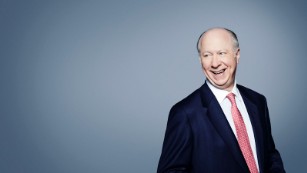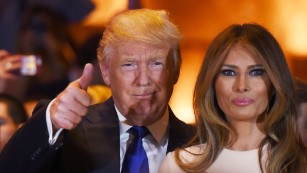共产档
MISH - MASH
正文
By David Gergen, CNN Senior Political Analyst
(CNN)Too often these days, we in the media like to proclaim that an event is "historic" when, in truth, it is a mere footnote. But after the Indiana primary, it really is true that historians will long be wondering whatever happened to American politics in the Republican presidential race of 2016.
For the first time in 75 years, a businessman with no prior political experience has virtually captured the nomination of a major national party. The last time this happened was when Wendell Willkie, head of a utilities holding company, stormed the GOP convention in 1940, winning on the sixth ballot. Willkie went on to become a popular figure who ran a strong race against Franklin Roosevelt before eventually going down by 10 points.
There is, however, a far greater significance to Trump's rise to power than his business background; he is the most unconventional figure either party has put forward in modern times. And, while he will enter a general election as an underdog, chances are not insignificant that he could actually win the White House, entrusted with the most important and powerful office in a fractured world.
In the coming months, American voters -- not to mention those of us who toil in the media -- need to do some serious sorting out of both his strengths and his weaknesses. Because the truth is that as much as Trump has dominated the airwaves, we still don't know the man anywhere near as well as we should.
What is obvious so far is that millions of voters see in Trump a man of strength who can reverse our national direction -- in effect, a turnaround CEO. Frequently, voters turn to candidates whose strengths compensate for the weaknesses of the sitting president. Thus, we elected Jimmy Carter because he seemed honest, a sharp contrast to the Nixon years. Then we turned to Ronald Reagan because he was an antidote to Carter's vacillation. After eight years of George W Bush's plain talk, voters were inspired by Barack Obama's soaring calls. Now, after the Obama years and a string of broken promises by their own leaders, many Republicans believe Trump gets it and will act decisively to address their frustrations. That he is unconventional and outrageous says to them he is real, not a phony.
Let's face it: Trump is also a maestro of marketing. He has understood the zeitgeist of the electorate better than anyone else (with the possible exception of Bernie Sanders) and has spoken to it with remarkable skill. No one understood as well as he did that the Republican field was relatively weak, not strong, and he has an instinct for the jugular that is unerring. Hillary Clinton's camp must surely have noticed how he spotted a key weakness in each of his GOP rivals and put them to the sword without breaking a sweat. Machiavelli could take lessons from this guy.
Yet there is much about Trump that scares. Roosevelt thought the two most dangerous men in the country were Huey Long and Douglas MacArthur. Why? Because he saw in each of them a demagogue who would lead the nation in terrible directions. Similarly, a good number of my academic friends think Trump could be today's Mussolini. I am not yet persuaded he is a new Mussolini, but he clearly bears resemblance to former Italian Prime Minister Silvio Berlusconi, a buccaneer who was a pretty awful leader for modern Italy.
There are other aspects of Trump that trouble me just as much. In recent weeks, I have had the opportunity to talk to a good many business leaders in New York who know Trump well. To a person, they tell the same story: They often enjoy social occasions with Trump and his wife, and they respect the way he has built his personal brand. But they say they would never, ever do business with him. Bankers and lawyers seem especially wary. In every business encounter, they say, the real negotiations don't start until the initial deal is struck. Then, according to their accounts, he begins haggling over every detail and insists on paying less than he promised. If you don't like it, he tells them, sue me. Then he can counter-sue. "It's always a nightmare," said one acquaintance.
What Trump thinks are mere exaggerations in business, they frequently see as falsehoods. Perhaps their accounts are self-serving or wrong; in my limited dealings with him, he has never lied to my knowledge. Indeed, in a meeting with my students once in New York, he was gracious and charming. But the country needs a clearer picture of Trump as businessman.
Another deep, personal reservation of mine is how casually he treats the arts of public policy making and diplomacy. A president of the United States is called upon to make extremely tough, complicated decisions that shape the lives of literally billions of people. Bringing good judgment to those decisions requires not only a sense of history, but also a mastery of detail and a steady, disciplined temperament. Trump has an excellent capacity to cut through a problem and see its essence. But he shows a disdain for the hard work then required to make wise decisions. He acts like he -- and he alone - -is blessed by the Creator to be able to do it all on the fly. You can't call it in as president.
As best I can tell, that same casual disregard for past traditions makes him oblivious to how he should talk about other political leaders and about other countries. Who else other than Trump would believe that his smear this week of Ted Cruz's father was OK -- never mind that he tied Cruz's father to the assassin of John F. Kennedy. That attack, based on no hard facts, was straight out of Joe McCarthy's playbook. But that didn't stop Trump, and many of his supporters on Twitter cheered him on. Sorry, but in my book, a future President of the United States owes more to standards of decency and good judgment.
In short, we have seen this week history truly in the making. But what we make of it from here will be a serious test of our democracy.
评论
目前还没有任何评论
登录后才可评论.






